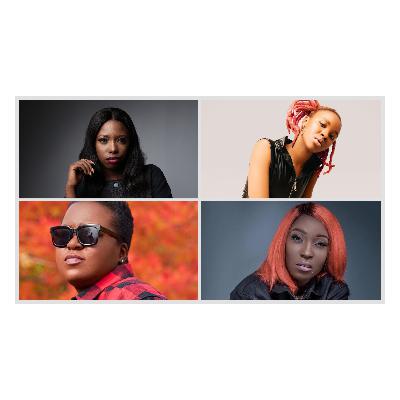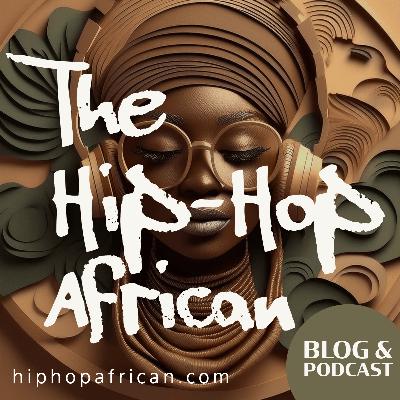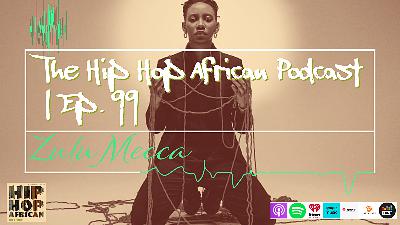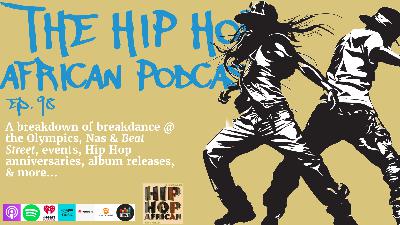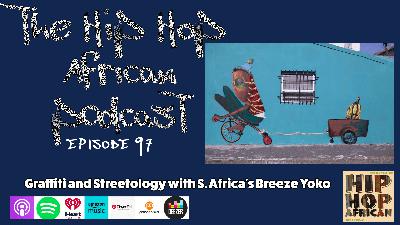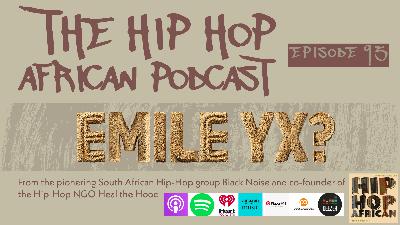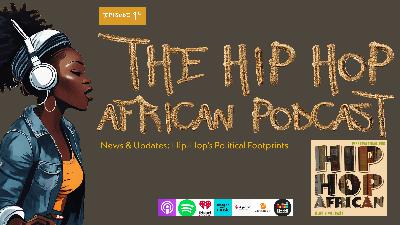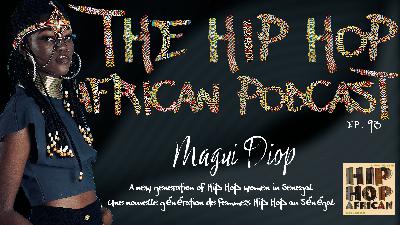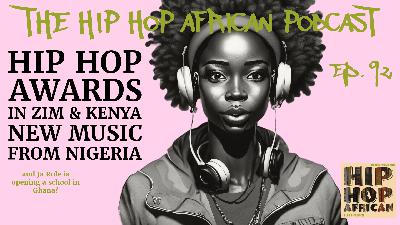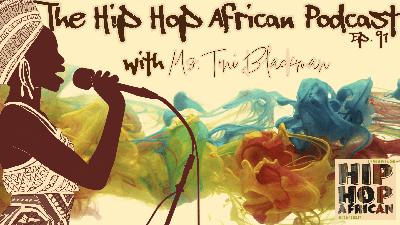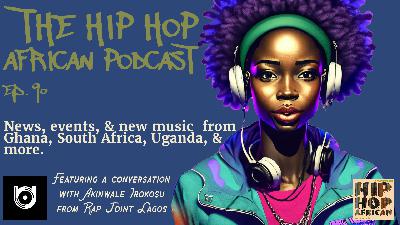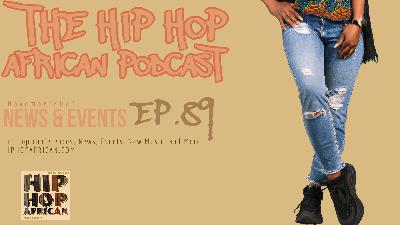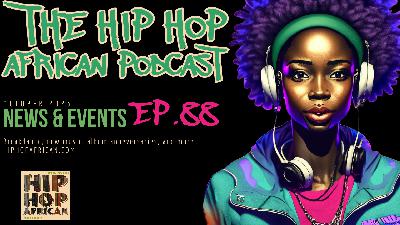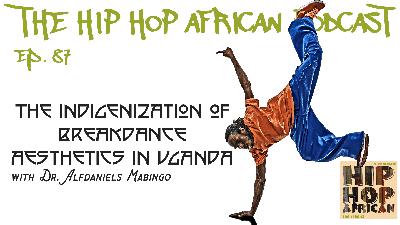Discover The Hip Hop African
The Hip Hop African

The Hip Hop African
Author: The Hip Hop African
Subscribed: 226Played: 1,096Subscribe
Share
© 2023 The Hip Hop African
Description
The podcast is the longest-running podcast on African Hip Hop culture. It features discussions on African Hip Hop music & culture from around the continent and the Diaspora. The podcast is produced in the Department of African Studies at Howard University. You can access the podcast at www.hiphopafrican.com and on all major podcast platforms.
113 Episodes
Reverse
In this episode, we’re bringing you a special mixtape featuring 24 tracks released in 2024 and 2025 by MCs from across the continent, including Ghana, Nigeria, Rwanda, South Africa, Tanzania, and Zimbabwe.
The mix highlights:
Languages: English, Swahili, Ga, Yoruba, and more.
Artists: Established names like Modenine, M.anifest, Nadia Nakai, alongside rising voices you may be hearing for the first time.
Sounds: From classic boom bap and Afrobeats-inspired beats, to high-energy club tracks, to conscious and introspective flows.
Inspired by U.S. hip hop podcasts that spotlight new music, this episode aims to showcase the incredible range of hip hop being produced internationally.
The mix begins with South Africa’s Zulu Mecca—who will also be speaking at this year’s conference—and closes with Yugen Blakrok, from her powerful new album The Illusion of Being. Check out the full playlist and links to the featured artists:
ZuluMecca "Iller Than"
Modenine "Adidas"
Wakazi "Crooked Crown"
Eno Barony "No Manual"
K. Keed "Dilemma"
Fid Q & Mex Cortez "Simba"
Sarkodie "Hustlers Dream"
Gemini Orleans "Gasoline"
Stamina "Bado Nipo"
AYORKOR RONZY "Darkovibes"
Falz the Bahd Guy & Shaybo "Popping Tonught"
Angel Mutoni "Ousaah"
Cassper Nyovest "Kusho Bani"
Gigi Lamayne "COME OUTSIDE"
Nadia Nakai & Moozlie "Sipthipithi"
Eva Alordiah "I Look Good"
Awa Khiwe "Rap Gandaganda"
Ugly Dray "Not Love"
Kweku Smoke "Agyekum"
Yanga Chief "What If"
Erigga "Just Breathe"
MOJO AF "Samson"
M.anifest "Gye Nyame"
Yugen Blakrok "The Grand Geode"
We’re also excited to announce that Howard University will host the 3rd Annual Hip Hop Studies Conference from November 14–16, 2025. This year’s theme is Respect the Technique: Hip Hop & Technology. The call for submissions is open until September 20, 2025. For details, visit hiphop.howard.edu.
In this episode of Let Her Cook called Unapologetic, two of our students dive into the world of African women in hip-hop. They discuss artists from West, East, and Southern Africa: Eno Barony (Ghana), Keko (Uganda), Gigi Lamayne (South Africa), and Reespect (Nigeria), women who aren’t waiting for permission to speak; they’re taking the mic and making space for themselves. From Keko’s fearless visibility as a queer rapper in Uganda to Gigi’s protest-driven lyrics in South Africa, these women use their voices as both art and activism. They also talk about braggadocio, that classic hip-hop confidence, and how African and African American women flip it to challenge what society says they should be. This episode is all about power, presence, and being unapologetically loud.
Check out our 2019 interview with Keko on Episode 38: Keko on Hip-Hop V. The Politics of Sexuality in Uganda.
Or our 2021 interview with Gigi Lamayne on Episode 63: Gigi Lamayne on Representation & Dismantling Respectability Politics.
Tracks
“Becky” by Amine
“Hello Africa” by Blitz The Ambassador
“Never Fight an African” by Styles P
“Sue Me” by Wale
“Sue me, I’m rootin’ for everybody that’s Black.” This lyric embodies more than a mindset as it reflects a movement rooted in solidarity. The African diaspora refers to the global dispersion of people of African descent, beginning with the trans-Atlantic slave trade and continuing through modern-day immigration. According to The African Diaspora: History, Adaptation and Health, the term first appeared in literature in the 1950s and refers to global communities whose ancestors migrated as early as the 15th century (Rotimi et al.). This term is often closely linked to Pan-Africanism–an ideology emphasizing solidarity and unity of people of African descent.
The global popularization of hip hop aided in creating a platform for artists of African descent, specifically those who migrated to the United States, to express their pride in their identity as well as resistance to racism in their countries. This mixtape explores how first-generation artists from the United States, like Style P, Aminé, Blitz The Ambassador, and Wale, use their music to reflect the complexity of belonging to the African diaspora, highlighting their heritage while speaking out against systemic oppression faced by Black people.
Since its origin in the Bronx, New York, hip hop has always been an outlet for speaking out about racial disparities and politics. One song on the mixtape, “Never Fight an African,” comes from David R. Styles, famously known as Styles P, who was born to a South African mother and Jamaican father in Queens, New York City, and has never shied away from speaking out about U.S. politics and resisting systemic oppression. In his song, “Never Fight an African,” Styles says:
“Not a Trump supporter, not a Clinton supporter, and Obama slipped too, we need to get it in order…if one brother starves, we ain't eat right” - Styles P
...highlighting a disillusionment with politics, across of parties. His main concern is the advancement of Black people, but in a country where systemic oppression is prominent, he refuses to align with any leader, even the first Black president, if meaningful progress is lacking. Aminé, an Ethiopian artist from Portland, Oregon, similarly addresses the idea that justice for Black people is not dependent on politicians or modern-day America in another song on the mixtape, “Becky,” when he says, “I'm fed up with the looks that we get in restaurants…I'm fed up with a world that I know I can't change.” His lyrics reflect the exhaustion from mistreatment due to his skin tone. Aminé, outwardly, spoke against the injustices in the U.S. during 2020, a year of civil unrest and an increase in Black Lives Matter protests. In an interview about the album done for French Fries Magazine, Aminé states
“My beliefs on these issues have always been the same. The music industry has amplified and spread the messages I believe in. I don’t hold back from letting my fans know what I stand for.” Amine
Together, Styles P and Aminé use their platforms to critique America’s failures in politics and affirm their identities as Black men in society by speaking out against the struggles they go through and reflecting a shared experience of systemic oppression throughout the diaspora.
On a lighter note, the mixtape also features songs celebrating their identity, reflecting the vastness of the diaspora. Blitz Bazawule, a Ghanaian artist known professionally as Blitz the Ambassador, makes his self-pride apparent in his song, “Hello Africa,” where he talks about traveling all over Africa to bask in its beauty and richness in culture. This song encourages unity amongst all African countries while also using African dialect and English to promote Pan-Africanism. Wale, a D.C. native with Nigerian heritage, expresses Pan-Africanism in the song “Sue Me.” Wale states, “I carried my bitterness of a kola nut…I favor Black businesses… spent ‘bout two racks on handmade durags” The “rooting for everybody Black” ideology is not just a lyric in Wale’s song, “Sue Me,” Though it may seem like just support for Black people, rooting for everybody Black represents Pan-Africanism, promoting unity throughout the diaspora. Both Blitz and Wale celebrate their identities unapologetically, conveying pride in being Black and a commitment to Pan-Africanism, which shapes the African diaspora.
In closing, it is evident that hip hop continues to serve as a vehicle for celebrating the African diaspora and reclaiming identity. Styles P, Aminé, Blitz The Ambassador, and Wale collectively embrace the range of shared experiences in the African diaspora–on one hand, there are rappers that use their music to speak out against hardships on Black people, whereas the others use it to highlight their love for their culture and to promote unity. This mixtape underscores how hip hop bridges the vast identities and culture throughout the diaspora and serves as a mirror for identity, pride, and resistance.
References
Magazine, FF. “Meet Aminé, a Jovial Rapper Tackling Political and Racial Injustice with His
Music.” French Fries Magazine - FF, French Fries Magazine - FF, 25 Nov. 2020, frenchfries-mag.com/interview/2020/11/17/meet-amin-a-jovial-rapper-tackling-political-and-racial-injustice-with-his-music.
Rotimi, Charles N, et al. “The African Diaspora: History, Adaptation and Health.” Current
Opinion in Genetics & Development, U.S. National Library of Medicine, Dec. 2016, pmc.ncbi.nlm.nih.gov/articles/PMC5318189/.
This episode is from a 2024 interview with Malal Talla—better known as Fou Malade—a legendary figure in Senegalese hip hop and co-founder of the activist collective Y’en a Marre. A key voice in Senegal's social and political landscape, Fou Malade shares his journey from early musical influences and socially conscious lyricism to organizing protests and grassroots mobilization through music.
In the interview, we explore:
His early days as an MC influenced by Pan-Africanism, figures like Kwame Nkrumah and Thomas Sankara, and groups like Positive Black Soul
The evolution of Senegalese hip hop from political consciousness to mainstream commercialization
The rise and impact of Y’en a Marre and its influence across Africa, including his arrest in the DRC
How governments have tried to co-opt or silence politically engaged hip hop movements
The role of hip hop festivals in fostering Pan-African artistic and political collaboration
His vision for a “new type of African”—one rooted in ethics, activism, and social responsibility
Whether you’re into hip hop, social movements, or Pan-African politics, this episode offers a powerful look into how culture can be used to inspire change across the continent.
We are back after a 1-year hiatus. It was difficult to maintain the production schedule as it was, so we will be scaling down a lot. We will continue to release conversations about Hip Hop in Africa and the African diaspora.
Our first episode back will be an interview with Senegalese hip hop artist and co-founder of the activist collective Y’en a Marre, Malal, aka Fou Malade. He is a major voice in Senegal's social and political landscape. Fou Malade shares his journey from musical influences and lyricism to organizing protests and grassroots mobilization through music. This includes his role in the Y’en a Marre movement and his arrest in the Congo in 2015.
Over the next couple of weeks, we will also be posting two bonus episodes, a podcast, and a mixtape created by students in the Hip Hop & Social Change in Africa class. Additional student mixtapes & podcasts can be found on hiphopafrican.com. This year, gender and the African diaspora were major themes in the projects.
The mixtape The Sound of the Diaspora: Identity and Resistance in African Hip Hop, features the following songs
“Becky” by Amine (Eritrea and Ethiopia)
“Hello Africa” by Blitz The Ambassador (Ghana)
“Never Fight an African” by Styles P (South Africa and Jamaica)
“Sue Me” by Wale (Nigeria)
In the podcast Unapologetic: African Women in Hip-Hop, two student hosts discuss the power behind the works of several artists, including Ghana’s Eno Barony, South Africa’s Gigi Lamayne, Uganda’s Keko, and Nigeria’s Reespect. The hosts like how these women aren’t waiting for permission to speak, but are taking the mic and making space for themselves.
“It’s not just a career move, it’s a statement”.Unapologetic: African Women in Hip-HopTweet
Again, the podcast will continue to post interviews and conversations around hip hop in Africa and the African world. The goal is to return to the monthly format, with shorter episodes, less than 20 minutes. This is more sustainable. On our website, we will continue to feature additional content and press releases, including information on hip hop events, releases, and news.
ZuluMecca, also known as Mandisa Nduna, has made a name for herself as a rapper and actress. With a unique style and powerful lyrics, ZuluMecca is a versatile artist who transitions between music and acting. A talented lyricist and actor, ZuluMecca's presence in the entertainment industry has continued to grow. She most recently released the EP Seams. This conversation with the podcast and our students took place in April, about 2 months before the EP dropped.
Look, I am in no physical condition to listen to wack shit"Iller Than", Seams EP
The episode opens with the track "Iller Than" and ends with the track "Job Not Finished", both from the new EP. In the episode, ZuluMecca discusses her entry into Hip Hop and some of her influences. She reflects on the balance artists must make between staying true to themselves and servicing the industry. She also talks about having a successful acting career and the relationships between her music and acting skills and interests.
ZuluMecca also talks about her spiritual journey and how that has impacted her career. During COVID-19, ZuluMecca reflects on her creative journey and taking the time to work on her writing and incorporating spirituality into her music. ZuluMecca became an ordained spiritual healer, using this background to inform her hip-hop and bring spirituality to her music.
I gave you prophesy, showed you the God in me
I gave you knowledge, gave you Garden routes
I gave Harlem Streets, I gave you Carter III, God MC
I gave you Vaudeville, all the skill in my discography
"Culture", Wept
ZuluMecca on Social Media
Go to the announcements page for information on events and albums discussed in the episode.
In this episode, I break down the road to breakdancing at the 2024 Paris Olympics. I also have a solo debate about the topic of appropriation, referencing Ada Enechi's 2023 article: Are Black People Being Pushed out of Hip Hop?
I also discuss the online hubbub about South African artist Tyla's racial identification, referencing Marti Bowser's article in Blavity.
There are also a few milestones to recognize.
30 years ago...In Ghana, Reggie Rockstone & others were starting the Hiplife movement. In Senegal, Positive Black Soul Recorded their 1st track "Boul Faale" ("Don't worry") in which they denounced the corruption of the local political system, and the groundbreaking group Daara J is formed. 20 years ago... K'naan released his 1st studio album, My Life Is a Movie. In Nigeria: Mode9 released his 1st album, Malcolm X. In Tanzania, X Plastaz released their first and only album Masai Hip Hop, which put Tanzanian hip hop on the map.
I'm doing a PhD in Streetology, in the University of LifeBreeze Yoko
Breeze Yoko created a series of works at the Hall Of Fame in Brixton, U.K.
Breeze Yoko is an internationally known South African graffiti artist. Breeze Yoko grew up in Cape Town, in Gugulethu and Nyanga East. He is known for his vibrant and thought-provoking street art, and for bringing a unique perspective to the urban art scene. His work often showcases a blend of cultural influences and social commentary, sparking conversations and challenging perceptions. With a bold and fearless approach to art, Breeze Yoko's creations have made a lasting impact on the streets of South Africa and beyond, inspiring others to see the world through a different lens.
Breeze Yoko on the graffiti scene in South Africa post-apartheid...
The domination of walls became very, very, very white at some stage, you know, and I think that also influenced what I wanted to reflect on the walls, I thought shit, you know, put on more us on the wall. We're in Africa after all. And slowly that gave birth to what is now slowly becoming a uniquely South African style. There’s crews in Joburg as well, who are adding Ndebele elements into their graffiti. You know, were were starting to learn how to borrow from our cultures in order to develop what we had seen somewhere else. And so, so yeah, the scene grew from that.
Breeze Yoko
Breeze Yoko's work often addresses topics such as inequality, poverty, and the struggles of marginalized communities. One of the remarkable aspects of Breeze Yoko's art is his ability to engage with the local community and involve them in the creation process. He often collaborates with residents, youth groups, and schools to create murals that resonate with the area's history and context. This approach not only beautifies the surroundings but also empowers the community to take ownership of the art and the messages it conveys. His dedication to using art as a platform for change and empowerment sets him apart as a talented and socially conscious artist in the street art scene in South Africa.
Breeze Yoko on the dilemma artists sometimes face when offered money for work that doesn't feed their spirit or takes them away from their goals ...
... that "gotta eat" has fucked us over. As a nation. As a generation. As a race. That "gotta eat" shit. That "gotta get the bag shit"... awe man, we're dying. And our creativity is dying from that as well Breeze Yoko
Breeze Yoko on social media
Twitter
Instagram
In this conversation, Kat and I had the pleasure of speaking with Cameroonian international student and hip-hop artist Astrid Mafogang about her experience in the music industry today as a part of the African diaspora. We dove into the complexities of identity and representation, gaining insight into Astrid’s music-making process and how she views and incorporates her Cameroonian identity into her music, despite living outside the continent and making much of her music in London.
A special thanks to Astrid for joining us and engaging in this great conversation! She is out on all platforms as Mafogang, please feel free to check her out!
"All of these different cultures are a part of me. I didn't want to limit myself to one sound."
-Six
SixSaidIt is a multifaceted artist who seamlessly flows across the borders between hip-hop’s hottest subgenres to create a sound that is uniquely her own. In this wide-ranging conversation, I had the opportunity to speak to Six about the cultural influences that compelled her to rap, her experiences navigating the music industry as an artist who refuses to be put in a box, her songwriting process, and more. Along the way, you’ll hear clips from her two singles “GOAT” and “Bite Size,” as well as her newest release “Japa 2 Japan” which is available now.
For more on SixSaidIt, you can follow her on Instagram, TikTok, and X @sixsaidit and stream her music on Apple Music, Soundcloud, Spotify, and YouTube. Want to learn more? Check out our previous article “Representing The Black Atlantic World: SixSaidIt” on the Hip Hop African blog now.
Special thank you to Six for being part of this episode.
This year, our Spring Series covers South Africa. In this episode, we have a conversation with South African Hip-Hop pioneer Emile YX?. Emile is part of the pioneering Hip Hop group Black Noise, one of the earliest Hip Hop groups in South Africa. He later co-founded the Hip Hop NGO Heal the Hood, which is based in the Cape Flats community of Cape Town, South Africa. A Hip Hop elder statesman, scholar, and educator, Emile visited the Hip Hop in Africa class to talk to us about his work and his scholarship.
Emile YX? Online
Emile YX?'s book Reconnect the String: the African Origins of Hip Hop Culture & It's Healing Power
A WordPress.com website
Publications
Toni at Howard University with Howard University and George Washington University students in the Hip Hop in Africa class
This episode is a sit-down conversation with Toni Blackman. Toni is an artist, hip-hop activist, writer, and cultural ambassador. She holds the distinction of being the first hip-hop ambassador to the U.S. State Department, and her work has had a significant impact on the global perception of hip-hop.
She has decades of experience in the U.S. and throughout Africa. She is one of the most well-traveled and experienced hip-hop artists out there and her work has earned her recognition and respect in hip-hop communities around the world.
We met up at the King Fahd Hotel in Dakar, Senegal this past December to talk about her work and to get her thoughts on hip-hop culture globally and the implications of changes in the industry for hip-hop artists. She talks about the idea of “conscious capitalism" and artists balancing art, business, and social impact.
You can make money and make social impact at the same time… I want more artists to know that and understand that.Toni Blackman
Toni leading a workshop at the Hip Hop 50 conference at Howard University
She also talks about the relationships between hip-hop artists in the Diaspora and hip-hop artists in Africa and offers advice for both. As an artist and activist dedicated to promoting the positive impact of hip-hop and mindfulness, she is recognized for her innovative work and contributions to hip-hop culture. She inspires and engages audiences through her art, education, and social entrepreneurship. Toni Blackman has left an indelible mark on the world of music and cultural diplomacy.
Music and art play a functional role in the lives of people of African descent.Toni Blackman
You can find Toni on all major social media platforms, including Instagram and Twitter as @ToniBlackman, and her website at ToniBlackman.com.
Beat by Modenine
Apple Music's Hip Hop DNA | The Sound of Freedom: The Evolution of SA Hip-Hop
Apple Music is celebrating the 50th anniversary of hip-hop with the “Hip Hop DNA” series. One episode is focused on South Africa. The Hip Hop DNA series shows the diversity of hip-hop sounds, histories, and communities worldwide through radio episodes, playlists, and album selections. This episode on South Africa spotlights the country’s hip-hop scene. It dives into the roots of hip hop in South Africa, looking at the early days in the 1980s and 1990s when legendary Cape Town groups like Prophets of Da City and Black Noise gained prominence. It also mentions groups like Skwatta Kamp and Teargas that achieved radio success in the 2000s and early 2010s. Also covered are the more recent hip hop stars – AKA, KO, and Cassper Nyovest – and a new generation of “kwasi-trap” rappers, such as Bravo Le Roux.
The South African public television network
SABC – released a series of documentaries to celebrate hip hop’s 50th anniversary internationally and 40 years in SA. The documentaries were shown on Sundays and ran from November 12th – 26th, with a special broadcast of this year’s Back to the City music festival. The first documentary, directed by SPeeKa, was titled “Slaghuis Joint Elements” and told the story of one of the country’s most impactful hip-hop movements, Slaghuis. The next documentary, “Ladies First Women in SA Hip Hop” looked at the gendered dynamics of rap in SA and how women have both shaped and been affected by the music. The final documentary, “Champion’s League,” looked at SA’s battle rap scene and focused on issues of freedom of speech and how youth culture has influenced the art form.
Move Afrika
Kendrick Lamar has teamed up with the philanthropic organization Global Citizen on an effort to establish a music touring circuit across the continent. A kickoff event for the “Move Afrika” tour will take place in Kigali, Rwanda at BK Arena on Dec. 6, with Lamar as headliner performing alongside other artists from Tanzania and Rwanda. Lamar is also working with his creative partner Dave Free and his company, pg Lang, on the tour, which has agreed to curate annual shows across the continent for the next five years as part of the initiative. Global Citizen focuses on eradicating poverty, so the Move Afrika project comes with a focus on job creation and attracting other of the world’s greatest artists to the continent. You can get tickets for the December show in Rwanda at moveafrika.org.
20-23 December | B-Global Indigenous Uganda Hip Hop Summit
THE 21ST ANNUAL CELEBRATION OF THE B-GLOBAL INDIGENOUS UGANDA HIP-HOP SUMMIT will be held in Kampala. This year it will be held December 20-23, and they will be celebrating hip hop's 50th this year. The B-Global Indigenous Uganda Hip Hop Summit is an educational platform that celebrates and encourages indigenous hip-hop in Uganda. The summit's vision is to educate and empower young people.
Links and information discussed in the episode
A Huis Clos, a play by French rapper Kerry James.
15 November - 3 December at Théâtre du Rond-Point in Paris France
A new play by French rap legend, Kery James and French director and writer Marc Lainé. In À huis clos, Kery James plays Soulaymaan, a lawyer whose brother is murdered by the police. Soulaymaan decides to take justice into his own hands and takes the judge who released his brother's murderer hostage. The play debates ideas around democracy, love, and forgiveness; and two visions of the world collide at the heart of a fascinating political drama.
Events
Golden Hip Hop Anniversary Conference | November 6-7 | Georgia State University in Atlanta
Held during the congressionally recognized Hip-Hop History Month, this conference will take place in Atlanta, GA on November 6- 7, 2023. The goal of this conference is to celebrate, acknowledge, and promote the importance of Hip-Hop culture in our lives and society. Specifically for this conference, we are interested in highlighting questions around Hip-Hop culture’s inclusion in different regions, southern women emcees and Hip-Hop, Hip-Hop’s future including the role of AI, the continued global expansion of the genre, and numerous other topics. This conference is especially beneficial and relevant in Georgia as Atlanta is now deemed the “Hip-Hop Mecca.”
Global Conference on Hip Hop Education | November 8-10 | California State University Long Beach
The 2023 Global Conference on Hip Hop Education will expand upon our previous theme, which focused on the foundation of the culture and explore how this culture both migrated out of New York to states like California (i.e. the Golden State), and into popular culture and academia in the late 1970s to mid-1980s. Our conference theme “From the Golden Era to the Golden State,” will guide us as we explore the foundation of this culture, understand what brought about an increase in cultural diffusion, and how lessons learned from the golden era can inform current pedagogies, interventions, research, scholarship and practices.
Hip-Hop Diaspora: Archiving and Celebrating 50 Years of the Culture | November 9-11 | University of Toronto
From Toronto to Havana, to London and Stockholm, we will consider the relationships between hip-hop street culture practices, archiving and preservation. Hip-Hop Diaspora: Archiving and Celebrating 50 Years of the Culture will focus on how global hip-hop voices collective marginalities through decolonial historiographic efforts and forges lasting people-to-people relations that echo economies of Black teaching beyond US borders.
Howard Journal of Communications Special Issue: Exploring the Past, Present and Future of Hip Hop
Whether analyzing issues related to its past or looking forward to what it might be in the future, th
The 2023 WDSF Africa Breaking Championship took place in Rabat, Morocco, May 6-7. 58 Breakers took part in the Championships, which was officiated by nine international judges, including Kaweesi Mark from Uganda and Vee from South Africa. Moroccan b-girl Elmamouny and b-boy Billy become the first athletes to qualify in the Olympics for breaking.
Moroccan b-girl Elmamouny defeated South Africa's Midian Leah to take the women's title and Moroccan b-boy Billy defeated Moroccan b-boy Tawfiq for the men's title, both winning the inaugural African Championship.
Moroccan b-girl Elmamouny is heading to Paris in 2024
The World Breaking Championship 2023 took place in Leuven, Belgium on September 23-24. The WBC featured 115 b-boys and 92 b-girls from 62 countries, including Algeria, Botswana, Cameroon, the Democratic Republic of Congo, Morocco, Senegal, and Tunisia.
Victor Montalvo (USA) won the men’s competition, Philip Kim, “B-Boy Phil Wizard,” (Canada) came in second place, and Nakari Shigeyuki (Japan) came in third. Dominika Banevic (Lithuania) won the women’s competition, beating Ayumi Fukushima (Japan).
Events
South African hip hop legend Emile YX? hosted a series of talks, discussions, and exhibitions in South Africa, celebrating 40+ years of hip hop in that country. Emile YX? is a member of one of South Africa’s oldest hip hop crews, Black Noise. Emile led these “Hip Hop as Healing” conversations to celebrate the impact of hip hop on youth. The event kicked off at the University of Cape Town (September 28th-29th) and closed at the Back to the City Hip Hop Festival in Johannesburg (October 7th).
The Jam Cypher Battles were held on October 7 in Lagos, Nigeria. Loudbase Ent hosted Top 8 Street Dance Battle Nigeria edition. Top 8 Street Dance Battle was founded in Ireland and funded by the Arts Council of Ireland. The event includes workshops and dance battles and brings together breakers, rappers, DJ,s and graffiti artists.
Book Release
Fashion Killa: How Hip-Hop Revolutionized High Fashion by Sowmya Krishnamurthy
New Album Releases
MC Caro My Way (Liberia)
Wale the Sage Running from Time (Nigeria)
Wordz People Forget to be People (South Africa)
Nasty C I Love it Here (South Africa)
Cassper Nyovest Solomon (South Africa)
Alfdaniels Mabingo (2022) Re-Contextualising Breakdance Aesthetics: Performance, Performativity, and Re-Enaction of Breakdancing in Uganda, Journal of African Cultural Studies, 34:4, 404-421, DOI: 10.1080/13696815.2022.2132473
In this episode, we speak with Dr. Alfdaniels Mabingo who wrote a fascinating article on breakdance in Uganda for the Journal of African Cultural Studies. Uganda has one of the largest breakdance scenes in the world, and Mabingo examines how the youth have reconfigured, localized, and re-interpreted breakdance aesthetics in that country. He argues that as breakdance spread, and youth innovated the art form, breakdance became part of Ugandan culture. In this sense, breakdance is no longer just a Western import, but Ugandans have evolved a breakdance into a Ugandan art form.
I always say, maybe breakdance is kind of this baby that arrived (in Uganda) by clinging on to the back of this mother that was rap.Alfdaniels Mabingo
The central thesis of Mabingo's article is to show how Ugandans have been able to localize breakdance and make it their own. He also talks about his research methods and his interest in what he refers to as “the jua cali theory”, which is about taking the imported and the local and repurposing them to create something new.
As a scholar and practitioner, Alfdaniels Mabingo was always fascinated as he watched young boys and girls who walked long distances to dance and share talents. He saw this as not just a practice but also a movement. He felt that these self-driven young individuals added character to the city of Kampala.
Alfdaniels association with breakdance groups such as Breakdance Project Uganda (BPU) in the last fifteen years, deepened his interest, and hence decided to interrogate breakdance. He realized that the more he investigated and researched breakdance, the more he noticed how breakdance also provides certain social services within the communities in Kampala and beyond. This service he calls the "functionalities of breakdance." Breakdancers such as B-boy Abdul, worked to inject locally manufactured ideas to make the breakdance responsive and understood in communities. He saw dancers explore ways of blending elements of breakdance and some elements of indigenous Ugandan dances, customs, and music.
The arrival of hip hop culture through breakdance, music, and fashion in Uganda influenced performers such as B-Boy Abdul. Alfdaniels says that in the 1990s, there was a desire among people from Uganda to imitate what was happening in the United States of America. Young Ugandans were heavily influenced by MC Hammer and 2Pac. Later, there was a desire to create something locally that spoke and appealed to Ugandan youth. B-Boy Abdul realized this after attending a competition in the United Kingdom with the "Top Floor" dance crew when their dance was categorized by the judges as not being breakdance. After his return to Uganda, B-Boy Abdul saw the need to take breakdance in Uganda to the next level by fusing breakdance with some elements of indigenous Ugandan dance.
The strength of breakdancers in Uganda, and …across the African continent… is the ability to look beyond the contours of their own space and their own aesthetics and imagination.Alfdaniels Mabingo
Dr. Alfdaniels Mabingo is a dance researcher, scholar, performer, and educator. He has a PhD in dance studies from the University of Auckland’s National Institute of Creative Arts and Industries, an MA in dance education from New York University, an MA in performing art
August - December 2023 | Culture Curators: Hip Hop 50 | National Museum of Accra (Ghana)
A new exhibit opens at the National Museum in Ghana in Accra. The exhibit runs from August 27 - December and focuses on hip hop’s global influence and the influence and contributions of Ghana in the global culture of Hip Hop.
They will be exhibiting texts on hip-hop, including Ice Cold: A Hip-Hop Jewelry History by Vikki Tobak, Back In The Days by Jamel Shabazz, Living the Hiplife by Jesse Weaver Shipley, Hip Hop Africa: New African Music in a Globalizing World by Eric Charry, and The Hiplife in Ghana: West African Indigenization of Hip-Hop by Halifu Osumare, and Hip Hop in Africa: Prophets of the City & Dustyfoot Philosophers by Msia Kibona Clark.
They will also be screening films showcasing Hip Hop’s influence globally and Ghana’s influence and contributions to The Culture
September 28 & 29, 2023 - Archiving Hip Hop: 50 years in the making - Milton Keynes, UK / online
An upcoming event in the UK will "highlight how global hip hop practitioners and hip hop scholars remember, historicise and archive the culture locally". It will highlight the local Milton Keynes hip hop scene from the late 1980s to the mid-1990s.
"Apart from standard academic talks and keynote addresses, the conference will also feature novel formats of knowledge production and dissemination, such as knowledge-droppin cyphers, graffiti literacies, or scratch-in-the-surface of ideas sessions. We want to emphasize that knowledge production within hip hop is both an intellectual and an embodied practice, so we explicitly invite participants to experiment with novel ways of presenting their ideas - in a hip hop way."
May 16-19, 2024 | European Hip Hop Studies Conference | Cork, Ireland
The International Council for Hip Hop Studies/le Conseil International Pour Hip Hop Et Recherche: CIPHER is a public scholarship project mapping hip-hop knowledge from communities across the world. The conference will be held at the University College in Cork, Ireland. Proposals due: September 2023
Pride Month: Embracing The LGBTIQA+ Community In African Hip Hop - Hiphop Africa
These are some of the artists featured in the article:
ZuluMecca | https://www.instagram.com/zulumecca
K.Keed | https://www.instagram.com/whodat_keed/
Dope Saint Jude | https://www.instagram.com/dopesaintjude
Mx Blouse| https://www.instagram.com/sandiblouse
Keko | https://www.instagram.com/kekotown1
Noti Flow | https://www.instagram.com/notiflowmusic
ZuluMecca | Wept | 2022
Burna Boy & Khaligraph Jones: Commentary on the Music Industry
https://youtu.be/p735vyEM574?si=HpwXuZ1y-w5cNpni&t=170
The conversation regarding Burna Boy's comments on the lack of substance in Afrobeats stems from a recent interview he did with Apple TV. The conversation regarding hip hop
Comments
 United States
United States


